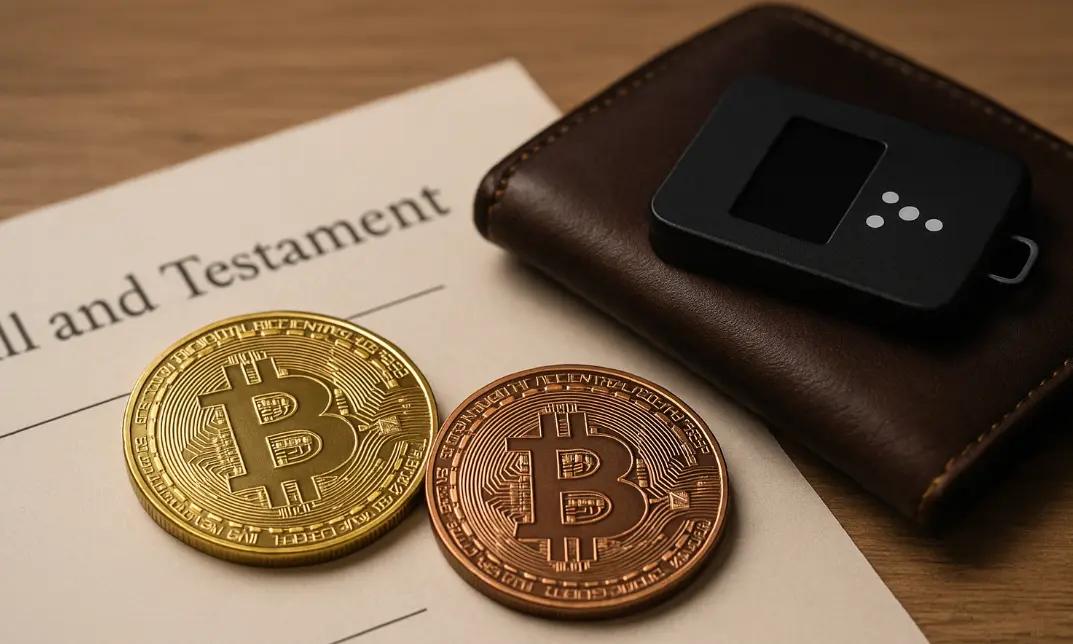BLOG
Secure Your Crypto for the Future
Learn the most effective ways to protect your cryptocurrency and ensure it lives on beyond you. This guide covers essential best practices — including secure storage, responsible key management, inheritance planning, and educating loved ones — to help you preserve your digital wealth and pass it on safely to future generations, without relying on banks or intermediaries.

Secure Your Crypto for the Future
Best Practices to Protect Your Digital Wealth for Future Generations
As cryptocurrencies become an increasingly significant part of financial portfolios, ensuring their secure transfer to future generations is crucial. Unlike traditional assets, cryptocurrencies are decentralized, meaning they require unique approaches to inheritance planning. This article explores the best practices for safeguarding digital wealth and passing it on efficiently.
The Growing Importance of Crypto Inheritance
Forgotten passwords are responsible for an estimated 90% of cryptocurrency losses according to a 2021 report by Datarecovery.com. In 2023 it is estimated that up to 1.45 million BTC, or some $24 billion, are forever lost because they were forgotten with passwords and misplaced private keys, which speaks to the extreme need to plan for crypto-inheritance.
Best Practices for Securing Crypto for Future Generations
1. Utilizing Multi-Signature Wallets
Multi-signature (multi-sig) wallets require more than one key to sign a transaction, provide security, and enable shared control by trusted parties such as family members or estate administrators. These service providers offer open-source, versatile wallets with multi-sig security features and insurance-backed custody solutions.
2. Private Key and Backup Phrases Safekeeping
Missing private keys is a common cause of missing crypto tokens. Secure keeping methods include:
- Hardware Wallets (Ledger, Trezor) – Most secure, These are offline computer devices containing private keys
- Encrypted USB Drives – A widely used alternative, Offer portability of keeping things but possibly less secure than dedicated hardware wallets.
- Paper Wallets – Least preferred due to risks of physical damage or theft. Involve printing private keys on paper; however, they can be physically damaged or lost.
3. Using Crypto Inheritance Services
Certain platforms assist in securely managing crypto inheritance. Although some growth statistics are difficult to find, the increasing popularity of cryptocurrencies has led to greater awareness of the need for inheritance solutions.
Crypto Inheritance Service Providers may provide insurance-backed crypto recovery service for beneficiaries, encrypted vault for secure private key distribution to designated heirs, digital inheritance solution using smart contracts or validation mechanisms or automated transactions.
4. Legal Documentation: Wills and Trusts
The incorporation of cryptocurrencies into legal trusts or wills can render the transfer of digital assets legal. Probable procedures or other legal and operational constraints can delay time to funds.
Most Common Methods:
- Traditional Will – Recognized by courts but risky if not properly secured. Legally valid but tends to carry with it probate procedures to delay access to assets.
- Crypto-Specific Trusts – Increasingly popular in countries like Switzerland and Singapore, where legal frameworks support digital inheritance. Specific to the case of digital assets, perhaps enhanced beneficiary access efficiency.
- Dead Man’s Switch Services – Automated release of private keys upon verification of the owner's death, although with a complex setup and management..
- Smart Contracts – Allow the pre-agreed conditions to complete transfer of assets subject to legal acceptance of such contracts in the relevant jurisdiction
5. Expected Timeframes for Crypto Inheritance Transfers
While crypto transactions can technically be completed in minutes, legal and operational factors can significantly impact the time it takes for heirs to gain access to digital assets.
Factors That May Delay Inheritance Transfers:
- Probate and Legal Verification – Probate can take anything from weeks to over a year, depending on the estate's complexity and jurisdiction
- Multi-Signature Wallet Delays – If multiple key-holders must approve the transaction, delays may occur if any signers are unavailable or if there are disputes among the parties. Encompass coordination among the key-holders that includes waiting in the event that someone is not available.
- Centralized Custody Solutions – Some services, such as exchanges that offer inheritance features, may have waiting periods and verification processes that can take weeks. Sites may contain verification procedures that extend the timeframe to asset release.
- Regulatory Hold-Ups – In certain countries, financial regulations may require tax clearance or identity verification before funds are released which lead to more delays.
6. Educating Beneficiaries
It is important to ensure that heirs are taught cryptocurrency security practices. Although some information on heirs' knowledge of crypto security is limited, the complexity of handling digital assets underscores the importance of education in this area. Educating heirs about wallets, private keys, and retrieval processes is essential.
Additionally, ensuring that beneficiaries understand potential delays due to legal procedures can help them prepare for accessing inherited assets efficiently.
Final Takeaway
With the rise in cryptocurrency usage, appropriate inheritance plans have become increasingly important. Installing secure storage methods, using secure wallets, leveraging legal documentation, and informing heirs can help to protect and transfer electronic wealth to the future generation.
Investors can safeguard their assets and provide heirs with the necessary tools to claim their inheritance successfully. Some methods may be subject to legal and operational restrictions, requiring patience and strategic planning, while there is a more simple, secure and automated alternative as BitInPeace suggests.
BitInPeace trustless security model minimizes custodial risks through storing only signed transaction data (not private keys). This model secure legacy through using a designated receiving wallet and signing future transfer requests in advance for automated execution upon detecting prolonged inactivity.
Come and check! You will see that BitInPeace enhances reliability and eliminates manual risk.
Related Reads about Security

Address Poisoning Attack Explained: Copy Paste Trap

Address poisoning attacks trick you into sending crypto to the wrong wallet by inserting a lookalike address into your transaction history.
BitInPeace Team
February 1, 2026

Crypto Inheritance vs. Multisig

A clear comparison between crypto inheritance platforms and multisig wallets. Learn what works best for securing your crypto.
BitInPeace Team
May 28, 2025

Cold vs. Hot Wallets for Inheritance

Discover the best crypto wallet types for inheritance planning and how to secure your legacy with cold storage and smart, automated transfer tools.
BitInPeace Team
May 18, 2025